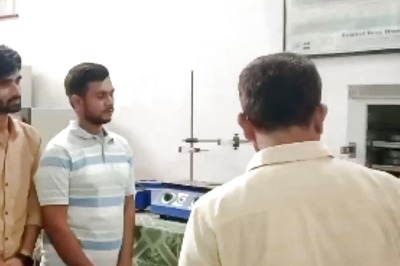
views
A message notification from a stranger. That was all it took for Soma Banik to be transported back to her teenage years, and for the memories of all the “horrific things” she went through to come flooding back.
The stranger in question was Janet James, who reached out to her one afternoon in June 2018.
“I need your help,” James messaged Banik on the social networking platform Quora. She described how she had been using a cream containing the steroid Betamethasone for over two years to lighten her skin and was experiencing disturbing side-effects. “Whenever I stop using it, my face starts itching and small blisters arise,” she wrote.
James had stumbled upon Banik’s skincare blog, in which she documents her own painful experience with topical steroid creams and had sent her an urgent plea for guidance.
Banik, who is now a 33-year-old state government employee from the suburbs of Kolkata, replied instantly. She gave James the advice she wished someone had given her: “Stop right away.”

Betamethasone is a potent topical corticosteroid medication habitually used to treat a wide range of skin conditions, including psoriasis and eczema, but one of the potential side effects is lightening of the skin.
Creams containing Betamethasone should only be used on the advice of a doctor and are typically acquired with a prescription. But in India, as CNN learned from doctors and users around the country, Betamethasone, and other corticosteroid creams, are regularly being misused as a skin lightening agent — mostly by women.
In 2003, when Banik was just 14, a neighbour told her mother how much their child had “benefitted” from becoming “fair” by using a new cream. “Your daughter will also become fair,” they said.
Wanting Banik to have the best prospects in a country where lighter skin is seen as desirable and associated with success, Banik’s mother took her neighbour’s advice. “I was disappointed that it came in a tube so unappealingly medicated,” Banik recalls, “but it held the secrets toward my fairer future.”
School friends were the first to notice, commenting on Banik’s newly acquired “good looks,” but within two months of using the steroid cream, she started to feel a burning sensation whenever she was out in the sun. She says she accepted this as part of the process: no pain, no fairness.
But one morning, the teenager forgot to apply the cream and within hours, a zit appeared on her chin. Though it quickly settled on applying the cream, Banik’s face started itching all the time. She soon developed acne and then, a year after the zit appeared, hair began to grow all over her face.

A drug-dependent face
CNN spoke with multiple Indian dermatologists all of whom confirmed that Banik’s symptoms — itching, acne, and hirsutism (hair on the face) — are signs of Topical Steroid Damaged/Dependent Face (TSDF), caused by the excessive or prolonged use of steroid creams.
Topical corticosteroids, such as betamethasone, have several medical benefits, including anti-inflammatory effects, but they should only be used for short durations and under the supervision of a doctor, ideally a dermatologist. Extensive use can cause a range of side effects, including pustules, where big rashes appear on the face, dryness, hypopigmentation (lighter skin), hyperpigmentation (darker skin), or photosensitivity (reactions to sunlight).
It is the potential for hypopigmentation that is thought of as desirable by many women, and leads to misuse of the drug, in turn, fueling a dependency.
Once the skin is dependent on a steroid cream, explains Dr Rajetha Damisetty, it is difficult for a person to stop using it. Every attempt to stop will lead to an eruption of pimples, rashes, and redness. “That’s why people go back to using it,” says Damisetty, chairperson of the Indian Association of Dermatologists, Venereologists and Leprologists’ (IADVL) task force against topical steroid abuse.
Even though numerous painful and visible side effects could develop from topical corticosteroid misuse, dermatologists told CNN that the practice is rampant in India — despite the introduction of restrictions in 2018 to limit access to these drugs.
In 2017, the IADVL filed a lawsuit called a Public Interest Litigation in the Delhi High Court seeking a ban on the sale of steroid skin creams without a valid prescription. The petition stated that the unregulated sale of corticosteroids had caused “serious adverse effects on the health of millions of Indians.”
While the Court has yet to rule, the government took action in March 2018, with the Health Ministry adding 14 topical steroid creams, including Betamethasone, to the list of Schedule H drugs that cannot be purchased without a doctor’s prescription.
But despite this reclassification, CNN has found that little has changed in the sale or use of these so-called “fairness creams.”

A silent epidemic of “astronomical magnitude”
India is a vast country with a large rural population and health services managed at the state level. As such, painting a complete, up-to-date picture of the misuse of steroid creams is challenging.
Still, there is enough evidence to show that whether in large cities or in rural areas, these restricted substances continue to be easily accessible, used as a skin-lightening agent and predominantly by women, and their perceived benefits promoted to users by friends, family, neighbours, TV commercials and even pharmacists.
In recent months, CNN has been able to buy four types of topical steroid creams over the counter in 16 pharmacies across the subcontinent: in the northern city of Delhi, Kolkata in the east, Ahmedabad to the west and Hyderabad in southern India.
Of six staffers in as many stores CNN spoke to, just one acknowledged being aware of the need for a prescription to buy the creams and continued to sell the product without one. The remaining five people appeared unaware of the reclassification and sold the creams, even after being questioned. Staff at the 10 other stores visited avoided questioning but sold CNN the creams, also without prescription.
According to doctors and users of steroid creams, the products are also readily available at grocery stores.
When asked what he thought about the continued over-the-counter availability of topical steroids, Dr Abir Saraswat, a dermatologist with 20 years of experience, says he believes India’s powerful pharmaceutical lobby is to blame, citing threats to strike and shut up shop. “Surely, no government wants to countenance that,” he says, adding that unless there is deep reform and regulation, there is no way to stop people from flouting the rules.

Dr Shyam Verma, a dermatologist who has published extensively on topical steroid misuse, agreed but told CNN that the problem goes beyond the pharmaceutical lobby. “There also seems to be a lack of will, and manpower, to implement the law by the governments’ drugs control departments, both at the central and the state level.”
CNN contacted the Indian Pharmacists Pharmacist Association, a trade group that represents pharmacist stores, which identified a different reason for the unregulated sale of steroid creams. “Technically, every pharmacy in the country should have a registered pharmacist sitting at the counter as long as the shop is open,” Abhay Kumar, the Association’s president says. But “there is no national count on who is at the counters.”
Kumar insists that his organization has been pressuring the Pharmacy Council of India, a central government body that regulates the licensing of pharmacists and pharmacy education, to make a list of registered pharmacists around the country to weed out the fraudulent ones. “So far, our demands fizzle into thin air,” he says.
Verma agrees that there is some truth that registered pharmacists are often not at the counters, but he explains that pharmacies with registered pharmacists are also known to sell these creams without a prescription.
The Pharmacy Council of India did not respond to CNN’s requests for comment.
The Ministry of Health and Family Welfare asked CNN to take the matter up directly with the current Drugs Controller General of India, Dr VG Somani. Somani’s office, in turn, declined to comment without official approval from the health ministry. The Ministry has not responded to CNN’s request for approval.
At the state level, the Deputy Drugs Controller for Delhi, Atul Nasa, did speak to CNN but says unregistered pharmacies and the over-the-counter sale of steroid creams are not problems in his state. “In Delhi, we only give licenses to pharmacies with a registered pharmacist. Now, if at a certain point they are not at the counter, we should be informed.”
He adds: “We have got no tip that Schedule H creams are being sold over the counter in our territory. If we do find evidence, we will surely take action.”
When informed that CNN was able to purchase creams at multiple sites without a prescription, Nasa simply reiterated: “Our team has no such information that these creams are being sold over the counter.”
While the ability to buy creams without prescription is causing many people in India to develop a dangerous dependence on topical corticosteroids and suffer from its multiple adverse effects, another factor is further adding to the problem.
According to Damisetty, corticosteroids are also present in many cosmetic creams, marketed explicitly as skin-whitening products and, alarmingly, steroids are often not listed as an ingredient. She tested one of the most popular products available and found it contained 0.056% Betamethasone. “That amount can surely cause drug dependence if used for a prolonged period,” says Damisetty.
“The findings were published in local media,” she says, adding that the company manufacturing the cream then sent her a legal notice disputing the findings. There was no further development, however, following the onset of the Covid-19 pandemic, Damisetty explains.
Now, Damisetty and the other dermatologists CNN spoke to want to raise the alarm before the problem gets any worse.
“Fairness mania-induced use of topical steroids” is a silent epidemic of “astronomical magnitude,” says Dr Koushik Lahiri. He highlights a 2020 article in the BMJ Open, which listed “public and professional ignorance, legal ambiguity and government inaction” as contributing factors to the epidemic.
“Action must be taken to curb the sale and use of such creams as fast as possible,” he says.

Eligible groom seeks fair bride
At the root of the widespread misuse of topical corticosteroids in India is the deep-seated belief that lighter skin tones are better than darker ones. And nowhere is this more visible than in India’s marriage culture.
In 2014, in Gurugram, a city southwest of Delhi, a woman killed herself. Her sister told reporters that the woman had been “fed up [with] the taunting [she received from her husband] regarding her skin colour.”
A year later, a schoolteacher from Kolkata set herself on fire. Before she died in hospital, she is reported as having said that putting up with constant humiliation for her complexion, and being told no one would marry her, was the reason she did it.
Matrimonial advertisements in the press clearly show the societal link between fair skin and desirability.
CNN analyzed ads posted in the Sunday editions of three of India’s biggest English-language newspapers — Times of India, The Telegraph and Hindustan Times — throughout the month of August, counting how many times the word “fair” was used, as well as similar terms such as “wheatish” or “medium complexion”. Of 1332 ads, 301 (22%) explicitly used these words, either as a selling point or as an attribute sought in a prospective match.
Dhruba Mukherjee, CEO of ABP Pvt Ltd, the media group that owns The Telegraph, told CNN that while “the publishing house does not endorse the use of these terms unless a word breaches the law, we cannot ask people to stop using any specific term”. He added that the ads “reflect the socio-cultural mindset of people”.
The Times of India did not respond to CNN’s request for comment and The Hindustan Times declined to comment.
Explaining the phenomenon, feminist activist and researcher Reena Kukreja says: “In large part, [the desirability of fair skin is] due to the association of dark skin with manual labour undertaken outdoors — dark skin was emblematic of low caste status”.
In an article published at the start of 2021, Kukreja outlined how “fairness as ‘capital’ conjoins with both regressive patriarchal gender norms governing marriage and female sexuality and the monetization of social relations, through dowry, to foreclose local marriage options for darker-hued women.” In other words, the darker-skinned and poorer you are in India, the harder it is for you to find a husband, and society reserves many privileges for married women.
“One thing I keep hearing is parents asking me to ‘fix their daughters’ skin problems fast,’” says dermatologist Dr Pallavi Kashyap. “Parents fear their daughter won’t find a prospective suitor unless they are fair.”
Relating this to her own experience and her mother’s decision to take their neighbour’s advice twenty years ago, Banik says: “Our country has this unfair beauty standard and I believe my mother wanted me to become fair so that people think that I am worthy of attention.”
“That’s what we all had seen and experienced all around us,” she adds.

A cautionary tale
It took Banik six years for her face to be weaned off topical corticosteroids, but she had been determined to stop. “One day, I woke up and decided not to use the cream anymore — I was ready for all consequences,” she says.
Those consequences included being mocked about her appearance. “My self-confidence dropped. I remember overhearing a classmate discussing how I looked worse than a pig and that stayed in my head for far too long. It took me years to rebuild my confidence.”
The burning sensation, acne and other symptoms eventually stopped, but the hair on her face is something Banik has to live with.
As for James, with Banik’s help, she learned how to relieve the itching that began when she stopped using betamethasone. A month after the two women first spoke, she wrote to Banik, explaining that she was worried about her skin condition because her parents were searching for a marriage alliance. “You saved my skin,” she wrote.
According to Banik, James is just one of the 650,000 people who have visited Banik’s blog to date, looking for information or advice. It is a small dent in the many women across India who may be suffering the pain of a drug-dependent face and the probable millions more who are making the decision to use steroids to lighten their skin for the first time. But if the authorities will not protect Indian women, Banik wants to increase their awareness so women can protect themselves.
Her experience is a cautionary tale. “I am a living example of what topical steroids can do to your face,” Banik says. “Are you listening?”
Read all the Latest India News here




















Comments
0 comment